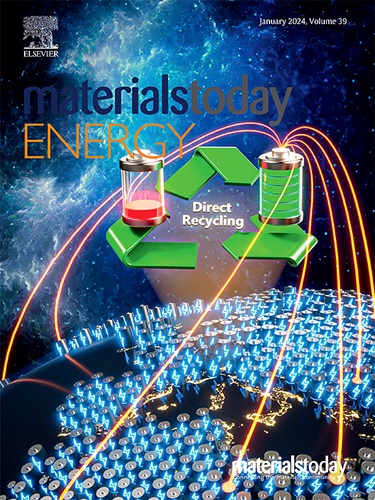Mechanochemistry induced mixed ionic/electronic conductive interphase enabling dendrite-free lithium metal anodes
IF 8.6
2区 材料科学
Q1 CHEMISTRY, PHYSICAL
引用次数: 0
Abstract
High-energy-density lithium metal batteries have shown promising applications in drones and electrical vehicles. However, the growth of lithium dendrites and the formation of unstable solid electrolyte interphase (SEI) become the main factors restricting their development. In this study, dendrite-free lithium metal anodes (ZB@Li) were developed with ionic/electronic conductive interface layers by a solvent-free mechanochemical method. By rubbing zinc borate (ZB) powder on lithium foil, a mixed interface layer is formed with the generation of lithium borate phase and the Li–Zn alloy phase. The lithium borate phase provides a low diffusion energy barrier and high ionic conductivity for sufficient potential gradient to induce rapid deposition of ions on the interface layer. The Li–Zn alloy phase owns the lithiophilic characteristic and a high electronic conductivity. The combination of the two phases provides mixed ions/electrons paths with enhanced transport kinetics and realize uniform and planar deposition of lithium. As a result, the ZB@Li symmetrical cell exhibits a prolonged cycling performance of over 4,200 h and the ZB@Li||LFP (LFP= lithium iron phosphate [LiFePO]) full cell shows a long cycle life for more than 500 cycles at 2 C with a high capacity retention rate of 84.6% at a high loading mass of 10 mg/cm.机械化学诱导的混合离子/电子导电相,实现无树枝状突起的锂金属阳极
高能量密度锂金属电池在无人机和电动汽车中的应用前景广阔。然而,锂枝晶的生长和不稳定固态电解质相(SEI)的形成成为制约其发展的主要因素。本研究采用无溶剂机械化学方法,开发了具有离子/电子导电界面层的无树枝状锂金属阳极(ZB@Li)。通过在锂箔上摩擦硼酸锌(ZB)粉末,形成混合界面层,生成硼酸锂相和锂锌合金相。硼酸锂相具有低扩散能垒和高离子传导性,可提供足够的电位梯度,从而诱导离子在界面层上快速沉积。锂锌合金相具有亲锂特性和高电子传导性。这两种相的结合提供了具有更强传输动力学的离子/电子混合路径,实现了锂的均匀和平面沉积。因此,ZB@Li 对称电池显示出超过 4,200 小时的长期循环性能,而 ZB@Li||LFP(LFP= 磷酸铁锂 [LiFePO])全电池则显示出在 2 C 下超过 500 次循环的长循环寿命,并且在 10 mg/cm 的高负载质量下具有 84.6% 的高容量保持率。
本文章由计算机程序翻译,如有差异,请以英文原文为准。
求助全文
约1分钟内获得全文
求助全文
来源期刊

Materials Today Energy
Materials Science-Materials Science (miscellaneous)
CiteScore
15.10
自引率
7.50%
发文量
291
审稿时长
15 days
期刊介绍:
Materials Today Energy is a multi-disciplinary, rapid-publication journal focused on all aspects of materials for energy.
Materials Today Energy provides a forum for the discussion of high quality research that is helping define the inclusive, growing field of energy materials.
Part of the Materials Today family, Materials Today Energy offers authors rigorous peer review, rapid decisions, and high visibility. The editors welcome comprehensive articles, short communications and reviews on both theoretical and experimental work in relation to energy harvesting, conversion, storage and distribution, on topics including but not limited to:
-Solar energy conversion
-Hydrogen generation
-Photocatalysis
-Thermoelectric materials and devices
-Materials for nuclear energy applications
-Materials for Energy Storage
-Environment protection
-Sustainable and green materials
 求助内容:
求助内容: 应助结果提醒方式:
应助结果提醒方式:


